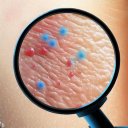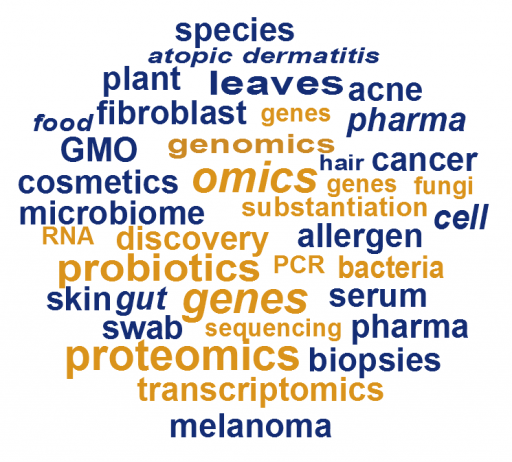News
 As kinetics and level of expression of omics are different, the multi-omics tendancy is to couple different omics in order to paint a much more comprehensive and detailed picture of what is occurring between the host and microbes in healthy and diseased states(1).
As kinetics and level of expression of omics are different, the multi-omics tendancy is to couple different omics in order to paint a much more comprehensive and detailed picture of what is occurring between the host and microbes in healthy and diseased states(1).
Recently, new studies on skin used metagenomics coupled to metabolomics (2) (4). Of course metabolomics is attractive as being the final stage of the metabolization of substrates and reaching the molecular forms of exchanges within the microbiota and with the host. Even if limitations like only 10% of microbial and human metabolites being identified in the databases (5), it remains interesting to know more about for example fatty acids which are the most important components in maintaining the skin barrier function or lactic acid which is a key component of the skin’s natural moisturizing factor and keeps skin hydrated (4), or lipids as key components of the skin (3).
Then, it is logical to couple the omics which are in charge of the functions and which detect the production of the functions, namely metaproteomics and metabolomics(6), which will better track the host-microbes interactions (2), as metaproteomics reaches simultaneously the proteins of the skin and its microbiota which produce the metabolites to be detected. It is particularly efficient as it is often seen that there is no change at skin microbial abundance, taxonomic or functional metagenomics level but shifts appear at the real functional and metabolic levels , as discussed by these authors.(4)
PHYLOGENE is familiarin using the complementarity between metagenomics and metaproteomics to obtain more focused claims .
Now based on its expertise in metaproteomics, PHYLOGENE is completing its proposed services as close as possible to real functionality with metabolomics dedicated to skin metabolism . This metaproteomics and metabolomics toolset makes it possible to generate knowledge of the effects of skin diseases or the mechanisms of action of cosmetics, prebiotics, probiotics or drugs targeting the skin microbiome.
Metaproteomics:
Proteins are in charge of cellular structures and functions of life activities. Proteomics provides insights into the composition and activity patterns of intracellular proteins and protein-protein interactions.
Metaproteomics makes it possible to achieve simultaneously the identification of the microbiome members, and a snapshot of the functions of the host and its microbiomes. The non-targeted approach gives the identification and relative quantification of the host and its microbiome proteins impacted by the studied phenomenon and produces a set of data reflecting the studied effect.
Metabolomics :
Metabolites are the molecules produced by the functional proteome in response to environmental stimuli. Metabolomics is the final stage of the metabolization of substrates and identifies the molecular forms of exchanges within the microbiota and with the host. The proposed approach is a targeted approach of relative quantification metabolites known for their role in the skin metabolism.
Multiomics :
With coupled metaproteomics and metabolomics, we use the potential of the two omics closest to the phenotype.
Our bioinformatics tools enable integrated and standardized proteomic and metabolomic analysis of global proteome and metabolome data. Enrichment of metabolic pathways and correlation analysis of regulatory mechanisms of upstream protein actors of metabolism and downstream metabolite changes provide a comprehensive view of the effects generated at the gut level.
(1) Simran S Sandhu, Aunna Pourang, Raja K Sivamani. A review of next generation sequencing technologies used in the evaluation of the skin microbiome: what a time to be alive. 2019 Dermatology on line journal Volume 25 Number 7| July 2019| 25(7):1
(2) Jacques C and all. Multi-omics approach to understand the impact of sun exposure on an in vitro skin ecosystem and evaluate a new broad-spectrum sunscreen.
Photochem Photobiol. 2023 Jul 24. ;00 :1-14
(3) Patra V and all. Ultraviolet exposure regulates skin metabolome based on the microbiome. Sci Rep. 2023; 13: 7207.
(4) Li M and all. Multi-omic approach to decipher the impact of skincare products with pre/postbiotics on skin microbiome and metabolome. Front Med (Lausanne). 2023; 10: 1165980.
(5) Peisl BYL and all. Dark matter in host-microbiome metabolomics: Tackling the unknowns–A review. Analytica Chimica Acta Volume 1037, 11 December 2018, Pages 13-27
(6) Oleg Karaduta, Zeljko Dvanajscak,and Boris Zybailov. Metaproteomics—An Advantageous Option in Studies of Host-Microbiota Interaction. Microorganisms. 2021 May; 9(5): 980.
News
 Nous avons plusieurs projets qui arrivent en parallèle, nous renforçons notre équipe et recherchons un chef de projet. Venez nous rencontrer, nous ferons du chemin ensemble.
Nous avons plusieurs projets qui arrivent en parallèle, nous renforçons notre équipe et recherchons un chef de projet. Venez nous rencontrer, nous ferons du chemin ensemble.
News
 PHYLOGENE to talk about omics technos for microbiome products effects substantiation
PHYLOGENE to talk about omics technos for microbiome products effects substantiation
News
 PHYLOGENE a été désigné meilleur poster à Targeting Microbiota 2022. Bravo à toute l'équipe
PHYLOGENE a été désigné meilleur poster à Targeting Microbiota 2022. Bravo à toute l'équipe
News
 Recevez au laboratoire un kit de biopsies de peau de CTIBiotech, appliquez votre produit, envoyez les biopsies chez Phylogene pour l'étude de protéomique, recevez vos résultats.
Recevez au laboratoire un kit de biopsies de peau de CTIBiotech, appliquez votre produit, envoyez les biopsies chez Phylogene pour l'étude de protéomique, recevez vos résultats.
News
 Notre poster à SID 2022 avec des partenaires pour l'évaluation des effets d'un ingrédient sur la peau et son microbiote
Notre poster à SID 2022 avec des partenaires pour l'évaluation des effets d'un ingrédient sur la peau et son microbiote
News
 DeepMicro: PHYLOGENE et le CEA s'associent dans un projet pour développer la métaprotéomique des microbiomes
DeepMicro: PHYLOGENE et le CEA s'associent dans un projet pour développer la métaprotéomique des microbiomes
News
 PHYLOGENE sera à IN-COSMETICS GLOBAL début Avril. Passez sur notre stand P84 pour voir nos nouveautés ou n’hésitez pas à prendre rendez-vous, nous serons encore plus disponibles pour échanger sur vos projets passés et futurs et savoir si nous pouvons vous aider.
PHYLOGENE sera à IN-COSMETICS GLOBAL début Avril. Passez sur notre stand P84 pour voir nos nouveautés ou n’hésitez pas à prendre rendez-vous, nous serons encore plus disponibles pour échanger sur vos projets passés et futurs et savoir si nous pouvons vous aider.
Phylogene, créée en 1999, est une société de services en biotechnologie utilisant les techniques de génomique, transcriptomique, protéomique, métabolomique et bioinformatique associée pour des applications d’identification et d’authentification ou pour mettre en évidence des effets biologiques.
Aujourd'hui, les applications sont essentiellement le service pour la santé dont le diagnostic, la cosmétique, l'environnement, sous forme d’analyse ou d’expertise, et à l’industrie du diagnostic, comme développeur de kits et à la filière agroalimentaire dont la détection des allergènes, la microbiologie, l'identification d'espèces et les OGMs.
Bonne visite !

Accréditation COFRAC n°1-2128-essais- portée disponible sur www.cofrac.fr
